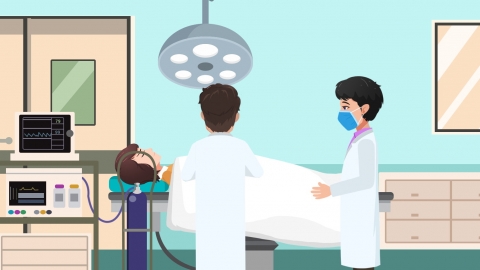What causes abdominal bloating after open abdominal surgery, and what should be done about it?
Generally, a bloated abdomen after open abdominal surgery may be caused by factors such as incomplete recovery of gastrointestinal motility, intra-abdominal gas accumulation, postoperative intestinal adhesions, intra-abdominal infection, or intestinal obstruction. Patients can choose appropriate interventions such as conservative management, medication, or surgical treatment based on their specific condition. Detailed explanations are as follows:

1. Incomplete Recovery of Gastrointestinal Motility
Surgical anesthesia can suppress gastrointestinal motility. If gastrointestinal function does not recover promptly after surgery, food and gas may accumulate in the intestines, leading to abdominal bloating. Early bed turning is recommended, followed by slow ambulation once permitted by the physician, to promote gastrointestinal motility. Sipping warm water in small, frequent amounts is advised, while avoiding early intake of gas-producing foods.
2. Intra-abdominal Gas Accumulation
Air may enter the abdominal cavity during surgical procedures, or excessive gas may be produced due to postoperative gastrointestinal dysfunction, resulting in gas accumulation and bloating. Abdominal massage can help expel gas, and rectal tube decompression may be performed as directed by a physician to relieve discomfort.
3. Postoperative Intestinal Adhesions
Surgical trauma may cause the intestines to adhere to surrounding tissues, impairing intestinal patency and obstructing the passage of gas and bowel contents, thereby causing abdominal distension. Under medical guidance, patients may take medications such as lactulose oral solution, domperidone tablets, or mosapride citrate tablets. It is also important to avoid overeating and to engage in light physical activity after meals.
4. Intra-abdominal Infection
Poor postoperative care may lead to intra-abdominal infection. Inflammatory stimulation can result in fluid accumulation in the abdominal cavity and slowed intestinal motility, causing bloating. Under medical supervision, antibiotics such as ceftriaxone sodium injection, metronidazole injection, or levofloxacin hydrochloride tablets may be administered. Additionally, keeping the surgical incision clean and dry is essential to prevent worsening infection.
5. Intestinal Obstruction
Intestinal adhesions or bowel edema may lead to intestinal obstruction, preventing normal passage of intestinal contents and resulting in bloating and abdominal pain. Immediate medical attention is required, including fasting and fluid restriction, along with gastrointestinal decompression. If conservative treatment fails, surgical intervention such as adhesion lysis or bowel resection with anastomosis may be necessary. Diet should be gradually reintroduced after surgery.
In daily care, patients should strictly follow medical advice when resuming diet, progressing from liquid to regular food. Regular postoperative follow-up visits are important to detect any intestinal abnormalities early. Maintaining a positive mindset helps avoid anxiety that could hinder recovery. Proper wound care is crucial to prevent infections and related complications.








